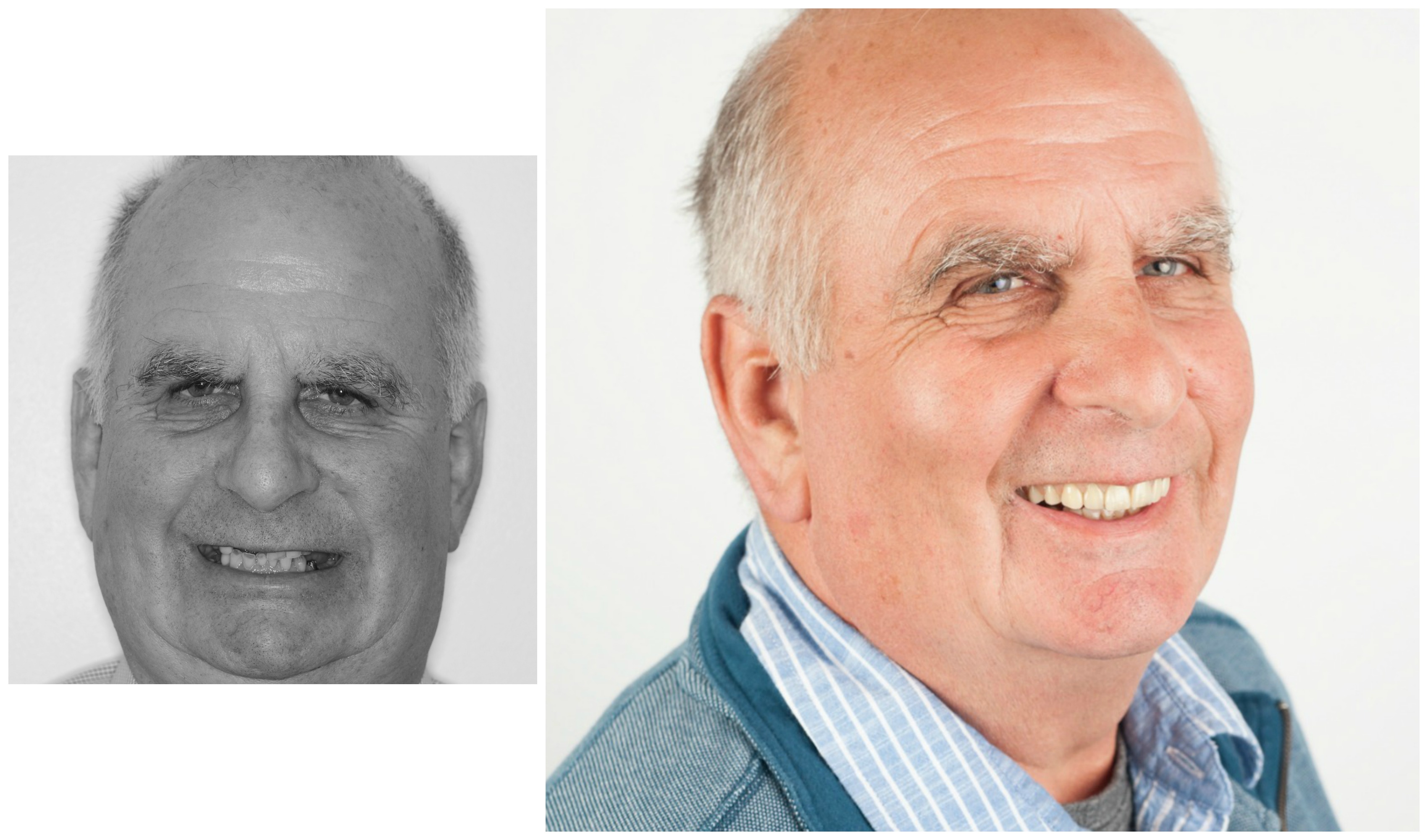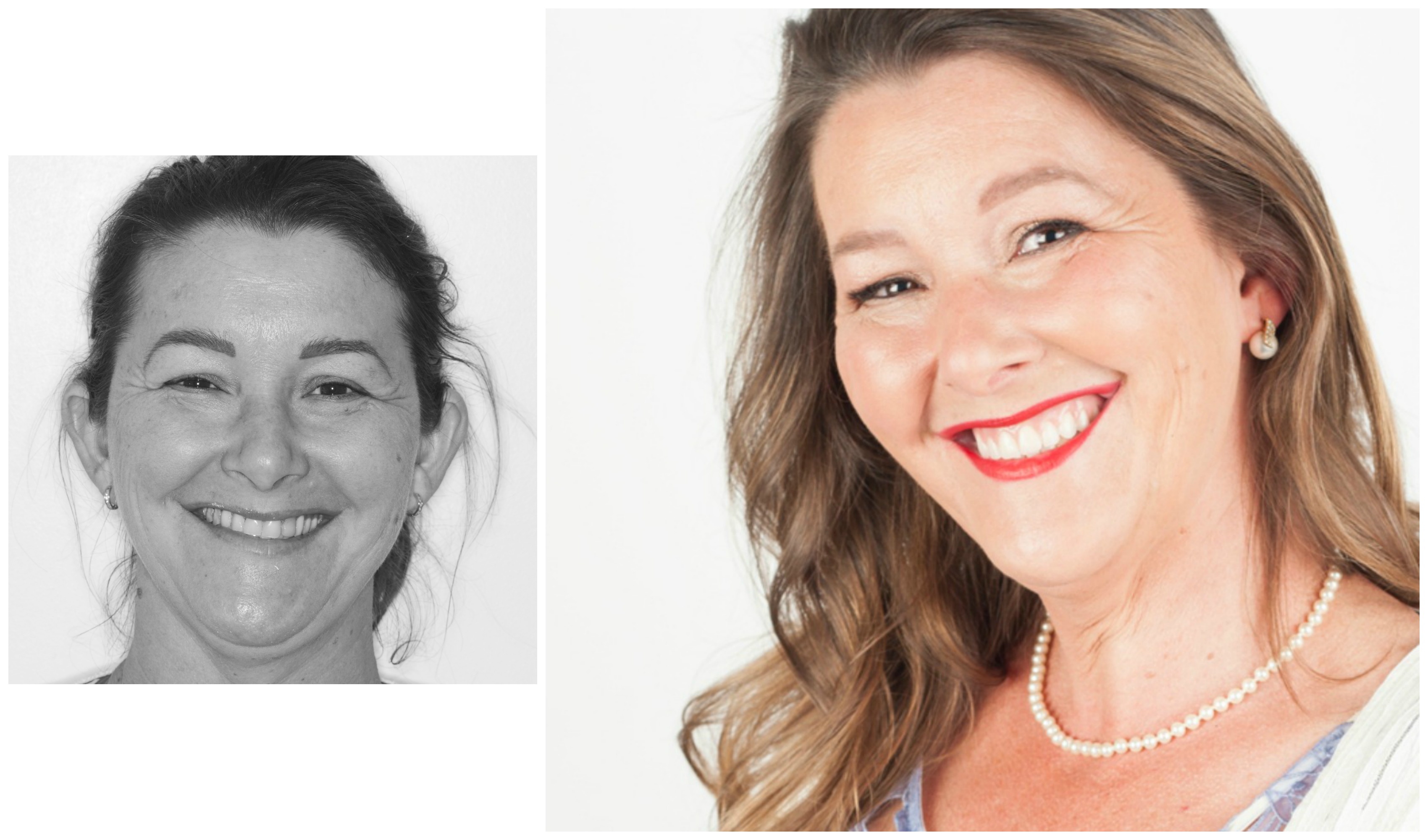Dental implants
If you have any missing teeth, this is for you.
No more dentures, bridges or gappy smiles.
We offer an elegant way of replacing gaps with bespoke life-long teeth.
It is a pain-free procedure, and the results are simply stunning.
See for yourself, as you meet just a handful of our previous patients...
Who can have dental implants?
Dental implants are perfect whether you’ve lost one tooth, several or all of your teeth.
We’ve treated people who have had teeth knocked out in a fall, a road collision, or on the sports pitch. We’ve treated people with gaps in their smile due to the legacy of an extraction-happy dentist, and even those who have broken off a tooth when trying to undo a bottle cap with their teeth. Please don’t do that! (But if you have, we’ll help.) And we’ve restored beautiful smiles to those who’ve suffered from gum disease or poor oral health.
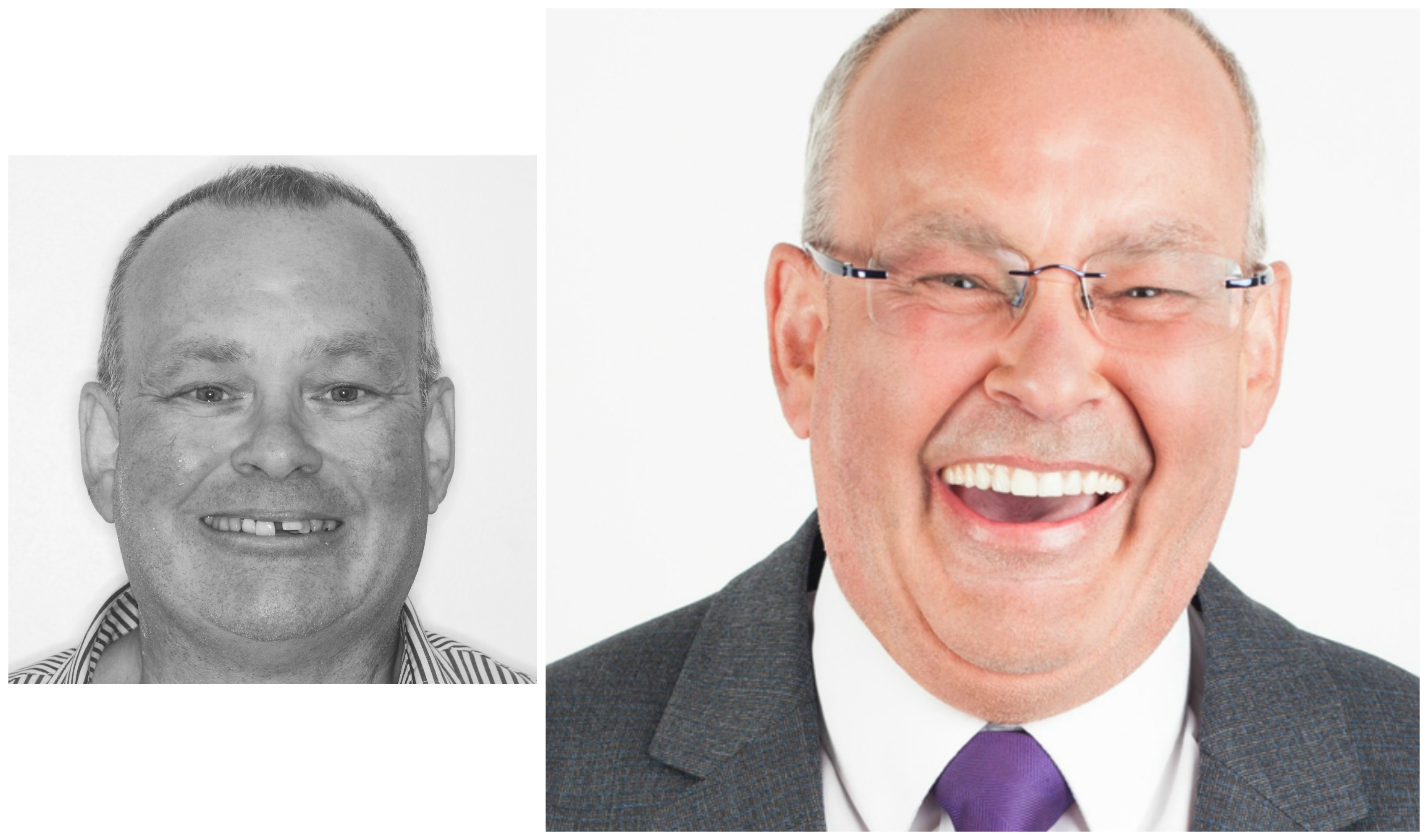

Dental implant surgery at Clinic95
Below, we’ve explained a little about exactly what dental implants are and how they work.
However, this surgery is totally bespoke. No two patients are the same.
So it’s impossible to describe exactly how implants might work for you. There are many ways that we can approach your own personal needs.
We’ll take into consideration your own feelings about your smile and your oral health. We’ll want to know about how your teeth or gaps affect your everyday life. What eating is like, how you feel about smiling. And we’ll talk about the pain of missing teeth, too.
We’ll assess your oral health, taking detailed information about your teeth, gums, jaw bone and bite, as well as assessing your overall health.


We’ll also take into account that you'll want to get your new smile as soon as possible. But you’ll be given the luxury of time – as much as you need. Ask as many questions as you wish, visit as often as you want; come and have a cup of tea and a chat. Together, we’ll explore all your options and find a way to get you the best possible smile.
It’s all very personal and friendly. Everyone here, from our reception staff to our surgical team, will get to know you well, and you them.
So what are dental implants?
An implant is a hollow titanium screw that is secured into your jaw
bone.
A small peg or ‘abutment’ is then screwed into the implant.
And a
crown is fitted onto that.
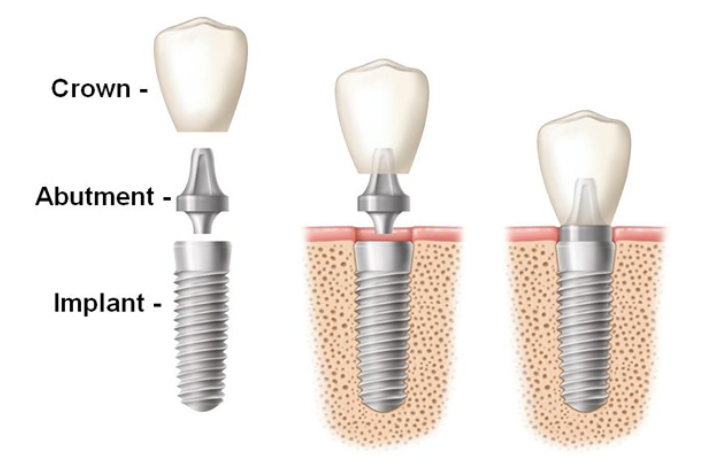 Diagram Courtesy of the American Academy of Implant Dentistry
Diagram Courtesy of the American Academy of Implant DentistryThis gives you a brand new tooth that is fixed – it won’t move. It’ll function like a real tooth and it has the normal life expectancy of a real tooth, too.

Maria says: "It’s not as gross as it sounds. Personally, what I think is gross, is a lifetime of keeping your teeth in a glass by the bed at night…"
We’ve been offering implants since 1996 and in that time have placed (and restored) over 4,000 of them.
However, since then, huge innovations have taken place in the world of implantology, that you can benefit from.
When we first started out, placing implants was a different process.
First, we’d fit just the implant – the little screw – into the jaw. And then you’d have to wait for the surrounding bone to grow around it – a process called osseointegration – which takes around six months. During this time you’d be fitted with a denture or temporary bridge to cover the gap(s), but these can come with all the usual problems of moving, and making eating troublesome.
However, since 2011, we’ve offered a system of placing implants that means we can affix your new teeth to the implant on the same day. It’s called Fast & Fixed, and we’ve completed over 160 cases.
Click here to read the case study of our very first Fast & Fixed patient Janice.

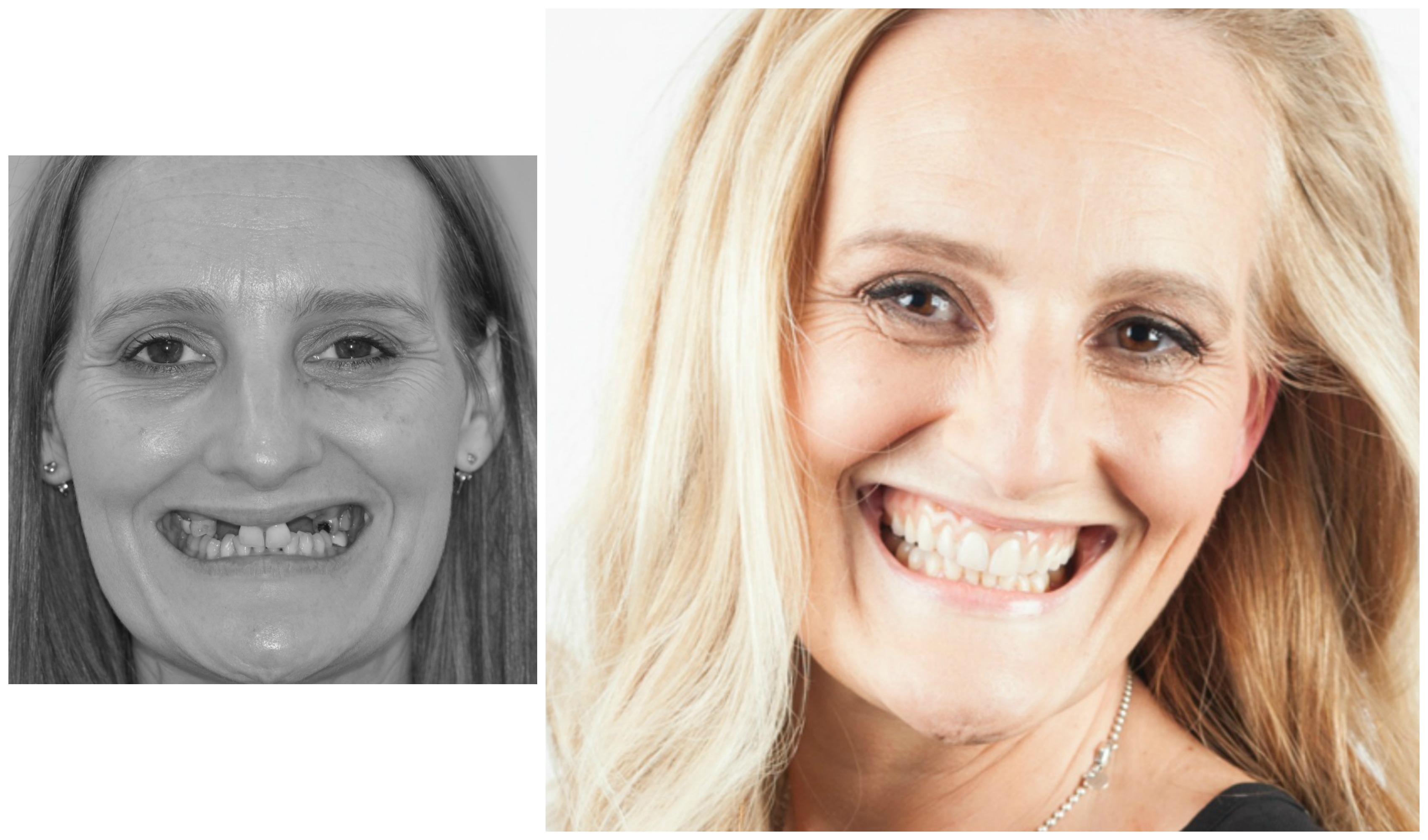
What is Fast & Fixed?
Fast & Fixed means that you can have your teeth fitted to the implants on the very same day.

Maria says, "With Fast & Fixed, the implants are placed and you get fixed teeth immediately. It’s not carried out in a hurry – as fast may suggest – but it simply gives you your teeth in a shorter period of time. In one day as opposed to six to nine months of waiting time."
With the Fast & Fixed system, the implant gets put into the bone, the abutment is screwed into it and your teeth fixed on straight away. Yes, those teeth are temporary (they’re made on an acrylic frame), but they are very close to how your final teeth will look, and they don’t come with any of the inconvenience of a denture – you treat them (and eat with them) as though they are your ‘real’ teeth.
So, the ‘Fast’ bit of Fast & Fixed is that you get teeth that fit into your jaw straightaway – not six months later. And the fact they are ‘fixed’ means no movement, and no denture.
Over the next six months, with your temporary teeth fixed in place, and while your implants settle into your jaw, we’ll take some further measurements of your mouth.
These are incredibly exact – accurate to the millimetre. And we’ll check every aspect of your bite in minute detail.
From all this data, your final teeth will be precision-designed onto a titanium frame, which is light yet incredibly strong and provides excellent stability for your teeth.
The process of replacing your temporary teeth with your final ones is a straightforward procedure, and you walk out with your new teeth. But our support doesn't stop there; we'll provide lots of aftercare and hygiene advice to keep your teeth and gums in tip-top condition.
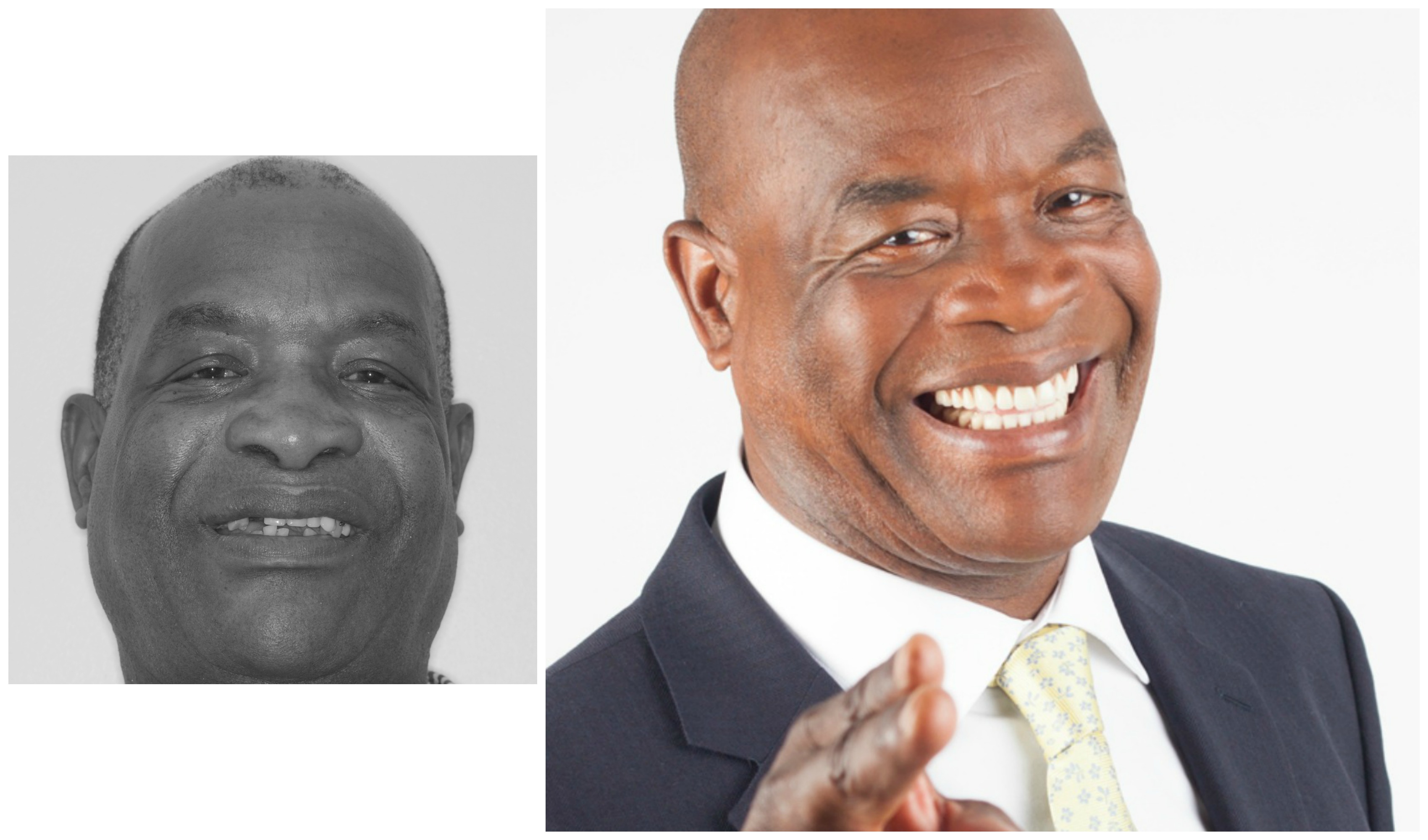

FAQs
will it hurt?
No, it doesn't hurt. Conscious sedation will relax you and anaesthetics will ensure you feel no pain at all during surgery.
Post-surgery
you may experience a little soreness for a day or two but this is
easily controlled by taking gentle painkillers, which we provide.

Maria says "Through a meticulous surgical approach, and the use of medication post-operatively, there is minimal pain, if any. Pain obviously depends on the person, but we’ve worked out a treatment method that gives patients great comfort afterwards. As a result, we have very few patients reporting any pain at all."
how long does the surgery take?
Pre-op planning is where the most work is done. It may only require one appointment or can take up to five, but these are often carried out at short intervals over just a couple of weeks.
And on the day of surgery itself?

Maria says "It doesn’t take that long – there’s a lot of preparation,
getting the instruments ready and preparing the surgery because we do it
in a totally sterile environment, exactly the same as a hospital
operating room.
But the procedure itself is relatively... I wouldn’t say quick, but it’s smooth and it’s over before you realize it."
Do dental implants really last forever?
They can.
But, nothing is permanent when it comes to health.
Your own teeth aren’t permanent if you don’t look after them. So we
can’t say that implants are permanent – if you neglect them and have
poor oral hygiene, they’ll fail, just like regular teeth would.

Maria says "Implants last as long as you remain in good health. If you
look after yourself and your mouth, practice good oral hygiene and
follow a healthy diet and lifestyle, implants can last a lifetime.
But don’t smoke. Smoking is the enemy of implants."
do implants ever fail?

Maria says "If you’re in
good health and follow our simple aftercare advice, we have no
expectation that that an implant will fail. Sometimes, however, an
implant will fail for no reason that we can explain, but that’s very,
very rare.
Implants have a well-documented success rate, 97% in the
maxilla (upper jaw) and 99% in the mandible (lower jaw). Here at
Clinic 95 we have success rates of over 99% and that’s over 20 years."
How much does it cost?
Prices do vary according to your own personal requirements and oral
health.
But as a general guide, single implants costs around £3200 per
tooth.
Fast & Fixed for the upper jaw costs from £22,000 to £25,000 and the lower jaw from £20,000 to £22,000.
can anybody have implants?

Maria says "We do look closely at your medical history.
Some cases
of poorly-managed diabetes would preclude you from having implants; the
hormones that are involved with diabetes can have a negative effect on
your bone quality, but also you’ve got a higher infection risk, the
healing can be poor and the blood flow compromised.
You also get
compromised blood flow through using nicotine products (smoking
cigarettes, pipes and cigars, and vaping) so smokers have a documented increase in
risk of implant failure.
We also look at osteoporosis diagnoses very carefully before deciding on whether we can proceed.
And we will look at the medications you’re on, as some may be incompatible with this type of surgery.
But
most importantly we treat every patient as an individual – when it
comes to implant surgery one size does not fit all. It is a highly,
highly personalised surgery."
how do i know if i'm suitable for implants?
The ideal way to find out is to come in and see us. We will have a
detailed chat and do a thorough appraisal and explain how implants could
work for you. We will always give you an honest opinion and explain the
pros and cons of the various choices and alternatives.
We promise you won’t be under any obligation, so come in and have a chat.
I need all my teeth replaced. can you do the top and bottom jaw at the same time?
Yes. We have done many of these cases very successfully.
Is there any food you can't eat if you have implants?
We advise a diet of soft food for the first three months following surgery. After that, you can eat as normal. most of our patients return to eating the foods they love after dental implant treatment. Apples, steak and crusty bread are back on the menu again.
I'm not local - is that OK?
Yes, of course.
We have patients come from all over the world for treatment here at Clinic 95 Oxford. If you are travelling any distance we will happily arrange accommodation for you and anyone accompanying you. Our reception team is always delighted to help in any way; so if you need accommodation, advice on travelling here or have any queries or requests, just give us a call. We'll do all we can to make sure you enjoy your stay here in beautiful Oxford.
what's your background?

Maria says "I’m a dentist with a special interest in dental implants; it is just
an area that has fascinated me for a long time - and I've been directly
involved with dental implants since 1996.
I’ve completed many
courses in the UK, Europe and the USA, and have learnt from some of the
grandfathers of implant dentistry such as Leonard Linkow (who was one of
the real pioneers) and Hilt Tatum.
I was then fortunate to be offered
a place to study implantology in Lille where I spent five years
studying a Masters degree. This was an incredibly didactic course with a
huge academic element, an absolute rigor to the teachings and also to
how we planned our patients, evaluated our patients, and the meticulous
methodology that we used to execute our treatment.
I’ve since built on this, expanding my skillset and learning from other colleagues and peers and I continue to do so.
I
am now an honorary clinical teaching fellow at Warwick Medical School
at Warwick University on their implantology Masters programme and I’ve
also been a clinical tutor for the University of Central Lancashire.
I now teach implantology to other dentists and have lectured in New York, Germany, Lithuania, Dubai, Singapore, South Africa, Morocco, Barbados and extensively throughout the UK."
I'd like to find out a bit more. Is there a charge for an initial consultation?

Maria says "At your first meeting with us, you’re under absolutely no obligation.
Just come in, meet me and my staff, have a chat about your teeth and get a feel for the clinic and the facilities we offer here.
It’s an ideal way for us to establish a rapport and explore your options together."
